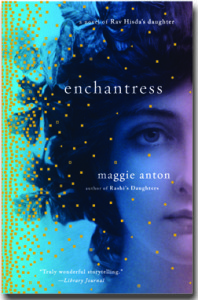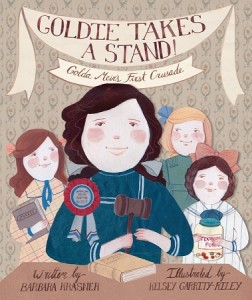Pre-Shabbat Jewish Literary Links

Shabbat shalom.

Shabbat shalom.
 I don’t often run guest posts here on My Machberet, but I’ve admired Maggie Anton for such a long time–and she asked me so nicely!–that I had to agree to her request. I hope you’ll enjoy discovering “three surprising things” that she learned about Jewish history while researching her latest novel, Enchantress: A Novel of Rav Hisda’s Daughter, which has been described as “a novel that weaves together Talmudic lore, ancient Jewish magic, and a timeless love story set in fourth-century Babylonia.”
I don’t often run guest posts here on My Machberet, but I’ve admired Maggie Anton for such a long time–and she asked me so nicely!–that I had to agree to her request. I hope you’ll enjoy discovering “three surprising things” that she learned about Jewish history while researching her latest novel, Enchantress: A Novel of Rav Hisda’s Daughter, which has been described as “a novel that weaves together Talmudic lore, ancient Jewish magic, and a timeless love story set in fourth-century Babylonia.”
Maggie Anton is the award-winning author of historical fiction series “Rashi’s Daughters” and “Rav Hisda’s Daughter.” She is a Talmud scholar, with expertise in Jewish women’s history. Intrigued that the great Talmudic scholar Rashi had no sons, only daughters, Anton researched the family and decided to write novels about them. Thus one acclaimed trilogy was born, to be followed by National Jewish Book Award finalist, Rav Hisda’s Daughter: Apprentice.
Please welcome Maggie Anton.
Three Surprising Things I Learned About Jewish History While Researching ENCHANTRESS: A Novel of Rav Hisda’s Daughter
Guest Post by Maggie Anton
Before getting to what I learned, I will admit how little I knew. Although Talmud has been the source of Jewish law and traditions for over 1500 years, only a few scholars are familiar with the rabbinic community who produced it. I was aware that Rav Hisda’s daughter lived in fourth-century Babylonia while the Talmud was being created there. I was intrigued that when he asked her which of his two best students she wanted to marry, she then replied, “Both of them.” And when I found that she eventually did marry both men, I was determined to write her story. That’s when my research really started. (more…)
And…I’m back! I had a wonderful time away. I was actually gone only from Friday morning to Monday morning (thank you, red-eye from San Francisco!). But they were days packed with friends and family, good times and good food, and, of course, some gorgeous scenery.
So now I’m back in New York, working hard in my new “day job” and balancing (or trying to balance) everything else. Hopefully, you’ve already seen the latest issue of The Practicing Writer, which went out to subscribers on Monday. (Believe it or not, I’m already hard at work on the October edition.) And, hopefully, I’ll have some other news to share with you soon!
 I don’t often discuss children’s books here on My Machberet. But I decided to make an exception when Barbara Krasner contacted me about her new picture book, Goldie Takes a Stand: Golda Meir’s First Crusade (Kar-Ben Publishing; illustrated by Kelsey Garrity-Riley), mainly because of my longstanding interest in Meir.
I don’t often discuss children’s books here on My Machberet. But I decided to make an exception when Barbara Krasner contacted me about her new picture book, Goldie Takes a Stand: Golda Meir’s First Crusade (Kar-Ben Publishing; illustrated by Kelsey Garrity-Riley), mainly because of my longstanding interest in Meir.
One hopes that most of the adults who pick up this book already know who Golda/Goldie is. For the younger folks, a biographical note after the main story explains the basics: Our heroine was born in Kiev in 1898, immigrated to Milwaukee in 1906, and went to Palestine in 1921. She was Prime Minister of Israel from 1969-1974.
The note adds: “Although the dialogue in this book is imagined, the events are true.” The story takes place in Milwaukee, and the plot depicts the child Goldie undertaking a fund-raising effort. As leader of the American Young Sisters Society, she directs a campaign with the purpose, as she explains, of “trying to raise money to buy school books for kids who can’t afford them.”
What’s especially nice here is the way that Krasner situates Goldie as an American girl, a Jewish immigrant in Milwaukee. Yes, she’s far better known in Israel. But the book reminds us of yet another bond between Americans and Israelis and a major figure in whom both countries can rightly take pride.
My thanks to Kar-Ben Publishing for the complimentary review copy.
“Anyone still wondering whether Salaita ought to have a teaching job should play the parlor game of reading his tweets and replacing references to Jews and Israelis with blacks, gays, or women. Should an American institution of higher learning employ someone who tweeted, say, that black Americans were ‘transforming “racism” from something horrible into something honorable since 1964’?”
Liel Leibovitz, “Tweets Cost Professor Steven Salaita His Tenure, and That’s a Good Thing” (Tablet)
“Prof. Salaita is entitled to his political views. However academic freedom is not a license for all possible speech: it does not protect hate speech or harassment, it does not legitimate the dehumanization of political opponents, and it certainly does not excuse incitements to violence. Institutions of higher education have a vested interest in protecting an atmosphere of reasoned discussion. Incendiary speech destroys that discussion.”
Russell Berman, “Academic Freedom and Academic Standards” (Hoover Institution)
“Liberal Zionists need to stop whining about how they feel about Israel, and, assuming they really care, work to assist the indigenous institutions fighting for their values. Otherwise, they’re not Zionists — they’re quitters.”
Andrew Silow-Carroll, “The Liberal Zionist Surrender,” New Jersey Jewish News
“What drove me away was the paper’s incessant denigration of Israel, a torrent of articles, photographs, and op-ed columns that consistently present the Jewish State in the worst possible light.”
Rabbi Richard Block, “Why I’m Unsubscribing to the New York Times,” Tablet (more…)